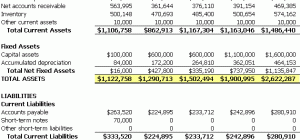 If you are a recent accounting graduate or looking to change careers, you have a few decisions to make. One of these decisions is what kind of organization you wish to work for. While there are many types of organizations who can use your accounting skills, you can generally break them down into two big groups: non-profit and for profit. There are some similarities between the two groups, but there are also some major differences.
If you are a recent accounting graduate or looking to change careers, you have a few decisions to make. One of these decisions is what kind of organization you wish to work for. While there are many types of organizations who can use your accounting skills, you can generally break them down into two big groups: non-profit and for profit. There are some similarities between the two groups, but there are also some major differences.
How Are Non-Profit and For-Profit Accounting the Same?
In both non-profit and for-profit accounting, the core of your goal is the same: to provide accurate and useful financial information. The type of education required for entry level in both types of accounting is the same. The job outlook for both fields is good. The Bureau of Labor Statistics predicts a 16 percent rate of growth in the accounting field between 2010 and 2020. Finally, both types of accounting require many of the same skills. You must be competent with accounting concepts, you must be able to communicate effectively, and you must be able to stay organized and pay attention to detail. Both types of accounting have similar stress-levels, as providing inaccurate information can have huge consequences for any organization.
Differences in Salary
An area where non-profit and for-profit accounting begins to differ is salary. In general, a for-profit accountant can expect to earn more than a non-profit accountant. Depending on location, a non-profit accountant's salary is likely to start out in the high $30,000's. In contrast, a for-profit accountant can expect to start in the mid to upper $40,000's.
Differences in Reporting
The main accounting differences between for-profit and non-profit accounting is in the type of statements that an accountant is expected to prepare. A for-profit organization is focused on maximizing profit, while a non-profit organization aims to meet a need. The type of statements each organization requires reflects those goals.
For-profit accountants can expect to prepare a balance sheet every quarter. This sheet details the owner's equity and has a direct impact on the company's stock. A non-profit, on the other hand, has no owner and does not use a balance sheet. Instead, it issues a "statement of financial position," a statement outlining the organization's net assets.
For-profit accountants should also be familiar with income statements, a report detailing the company's expenses, losses, gains, and revenues. Non-profits use a statement of activities, a document that lists the organization's revenues less their expenses.
Differences in Taxes
Non-profits are in many cases exempt from taxes. In most cases they are only assessed for the things that are secondary to their scope. They may be responsible for real estate tax or sales tax, for example. In addition to secondary taxes, for-profits are responsible for taxes on their earnings.
Differences in Mission and Accountability
Choosing between working for a for-profit or non-profit organization often comes down to a person's own mindset. The mission of a non-profit is to fill a societal need, while the mission of a for-profit is to maximize earnings. These differing goals affect the culture of the organization. They also affect who the organization is accountable to. For-profits are accountable to their shareholders while non-profits are accountable to the public. Each of these forms of accountability has its own pressures, so choose accordingly.
The differences between non-profit and for-profit accounting, such as accounting for pledges receivable vs accounts receivable, can be enough to lead anyone in one direction or another. Depending on your goals and attitudes you may find one area more appealing than another. Despite the differences, both types of accounting jobs allow you to make a difference to an organization. The skills you need for both are the same, making both an achievable choice when entering the accounting field. Finally, always seek out professional accounting advice before making important financial decisions.
Sarah Jackson is a freelance writer and editor in the San Francisco Bay Area. She lives with her three kids, two cats and one dog in an apartment with a view of the bay.







